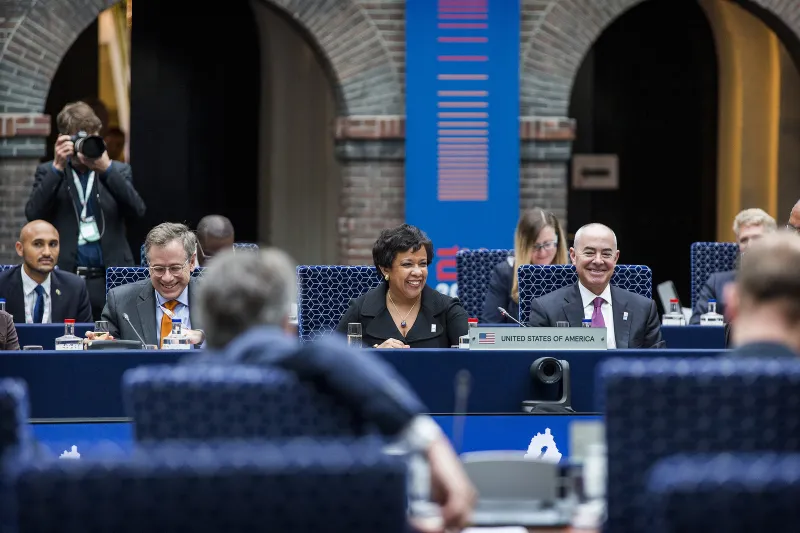For Immediate Release
DHS Press Office
Contact: 202-282-8010
Today the EU-U.S. Ministerial Meeting on Justice and Home Affairs, hosted by the Netherlands Presidency of the Council of the EU, took place in Amsterdam. This meeting is held usually twice a year, to evaluate and advance Trans-Atlantic cooperation in the areas of freedom, security and justice.
Dutch Minister of Security and Justice Ard van der Steur welcomed representatives of the United States of America, Attorney General Loretta E. Lynch and Deputy Secretary of Homeland Security Alejandro Mayorkas. He also welcomed Commissioner for Migration, Home Affairs and Citizenship, Dimitris Avramopoulos and Commissioner for Justice, Consumers and Gender Equality, Věra Jourová, representing the European Union.
In this Ministerial meeting, the EU and the United States reaffirmed their commitment to closer cooperation, especially in the context of evolving and shared challenges that affect the security and rights of citizens on both sides of the Atlantic.
Today’s signing of the "Umbrella" agreement[1] represented a major step forward in EU-U.S. relations. The agreement sets high standards for the protection of personal data transferred by law-enforcement authorities. It also strengthens legal certainty and enhances the rights of citizens which in turn will facilitate EU-U.S. cooperation to combat crime, including terrorism. The EU and the United States are committed to work together in the implementation of this agreement to ensure that it benefits both citizens and law enforcement cooperation. The next step will be to seek approval by the European Parliament.
During the Ministerial Meeting, the delegations focused on ways to address the migration crisis, on their respective visa policies, and on information sharing in the context of security, on counterterrorism policies and terrorist financing, on money laundering, data protection and on practical cooperation to tackle transnational organised crime. The exchange of views covered issues including the protection of refugees, global resettlement efforts, effective border management and dismantling organised criminal migrant smuggling networks.
The EU and the United States first discussed ways to address global migration by developing safe, regular and orderly migration processes whilst ensuring international protection for those who need it. The discussion focused on opportunities to mutually reinforce and coordinate their actions in this respect while also establishing high security standards. They agreed that the current migration and refugee challenges require global solutions through increased international cooperation and regional action. In this respect they reaffirmed their commitment to work together in the lead-up to the upcoming UNGA High Level Meeting addressing large movements of refugees and migrants and to the U.S. hosted Leader-Level Refugee Summit, to be held in September 2016 in New York.
The EU and U.S. exchanged views on visa issues and the respective legal frameworks. They agreed to maintain their constructive dialogue at all levels to achieve mutually beneficial solutions.
The EU and the U.S. discussed initiatives to improve counterterrorism efforts, including border security, screening of travellers and information sharing, as well as cooperation to better identify terrorist and foreign fighter travel. They also agreed to reinforce their dialogue on Chemical, Biological, Radioactive and Nuclear material and on its possible use by terrorist networks. They discussed legislative initiatives to improve information sharing, and to streamline efforts to combat terrorist financing and money laundering.
They also discussed a 5 year review of the 2010 EU-U.S. Mutual Legal Assistance Treaty, a key mechanism for transatlantic criminal justice cooperation. The EU and the U.S. confirmed that the Treaty is working effectively and identified areas for further practical improvement. The US and the EU committed to implementing those recommendations. These recommendations include enhancing training and specialisation of practitioners, improving the way joint investigation teams work together, using technology to avoid delays, and making it easier to track criminal proceeds by identifying bank accounts. Facilitating access to electronic evidence is a particular concern of the review, and the participants committed to improving their practices through which they obtain such evidence.
Following up to the commitment made at the EU – U.S. Summit in March 2014, the EU and the U.S. reiterated their desire to tackle jointly the issue of transnational child sex offenders, acknowledging the operational conclusions of an EU – U.S. expert meeting held in September 2015. The EU and the United States recognized the importance of improving operational cooperation to protect children from transnational sex offenders.
Concluding the discussions, Europol and the US jointly presented the results of a successful EU-U.S. operation that brought together law enforcement authorities from across Europe and the US to dismantle an important drug trafficking network and seize the proceeds of their crimes.
The EU and the United States committed to continuing their regular dialogue and to hold another Ministerial meeting in the second half of 2016.

###
[1] Agreement between the European Union and the United States of America on the protection of personal data when transferred and processed for the purpose of preventing, investigating, detecting or prosecuting criminal offences, including terrorism
